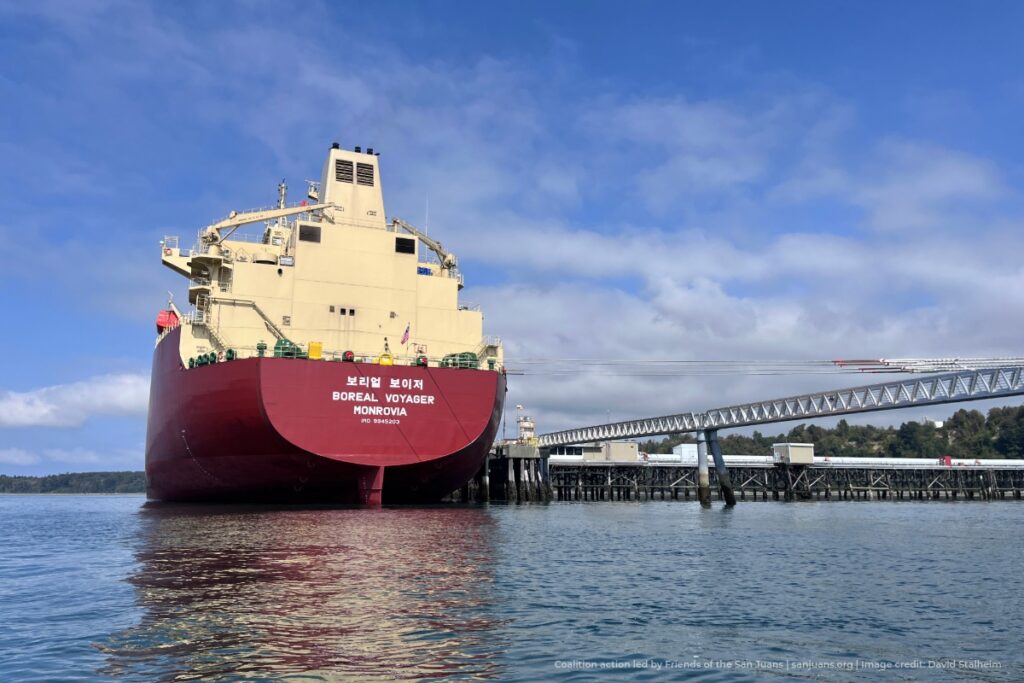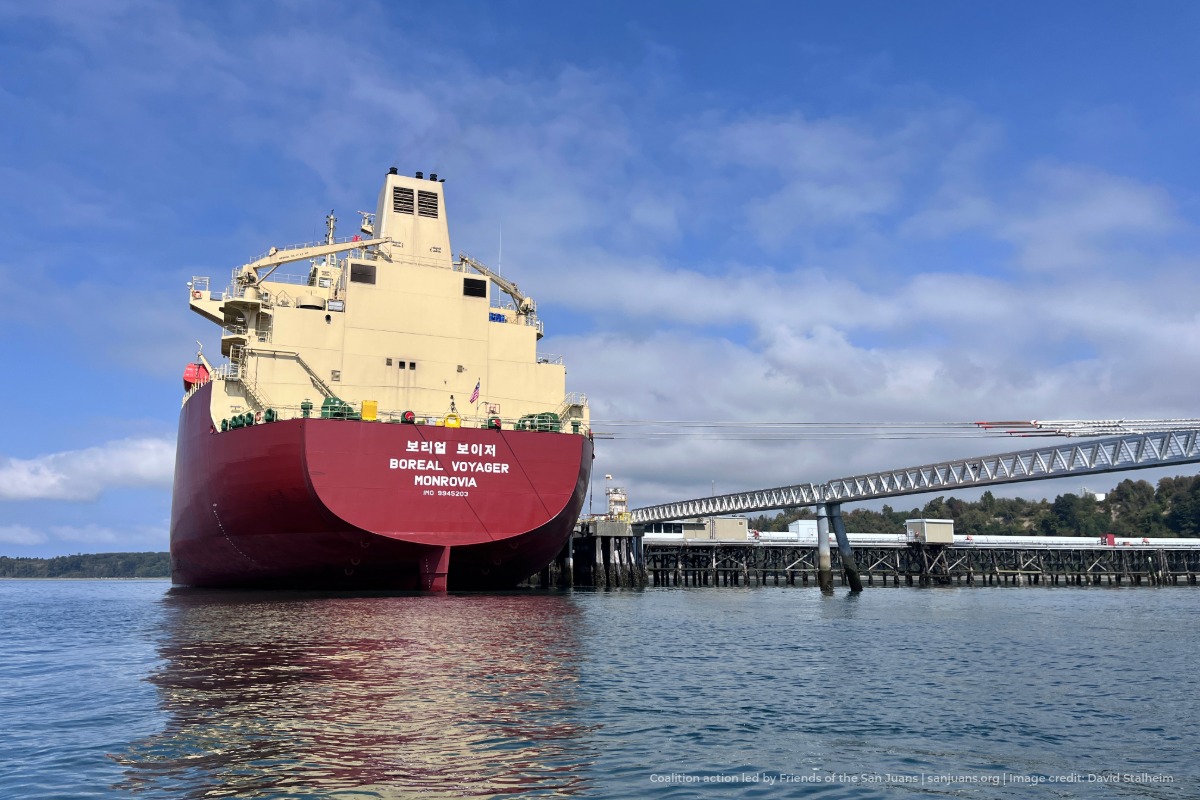
Friends is leading a coalition of six environmental organizations, represented by Earthjustice, in appealing a permit decision for 31 prior unpermitted projects and two new projects that have and will expand propane and butane imports and exports at the AltaGas ALA Energy Ferndale Terminal. Whatcom County issued a Mitigated Determination of Nonsignificance (MDNS) for the terminal, rather than requiring an Environmental Impact Statement (EIS) for the terminal projects. Under the State Environmental Policy Act (SEPA), an MDNS is given when the project(s) are determined not to cause significant environmental harm, so long as the conditions outlined in the MDNS bring impacts below a “significance threshold” set by the regulating agency, which in this case, is Whatcom County.
Our coalition appealed this decision, arguing that an EIS should be required to fully assess and mitigate the expansion projects’ risks and impacts, and that the County’s decision exposes communities and endangered species to increased safety risks and environmental harm while undermining efforts to transition away from fossil fuels.
“The deceptive expansions at the Ferndale Terminal undermine orca protections enacted by the state and the over $3.8 billion dollars spent over the past several years to ensure these whales do not go extinct. These expansions are contrary to many of the orca protection policies adopted by the state, local governments, tribes, and stakeholders, undermining the work conducted over the past eight years to protect Southern Resident orcas.” – Stephanie Solien, Friends of the San Juans Board Member and former Co-Chair of the Governor-Appointed Southern Resident Orca Whale Task Force
The appeal hearing took place at the Whatcom County Courthouse in Bellingham, WA from January 28 – 30 where the attorneys for the coalition presented its case for why an MDNS is insufficient for the scope of the projects at the terminal and explained why a comprehensive EIS should be required prior to permitting the projects outlined in ALA Energy’s Conditional Use Permit (CUP) application to Whatcom County.
Attorneys for the appellants, Whatcom County, and AltaGas (ALA Energy) have until March 6, 2026, to submit closing arguments in writing. The Hearing Examiner is expected to issue a ruling within two weeks after that date.
Appealing the MDNS with Community Support
This appeal would not have been possible without the experts who submitted written testimony (see links below) and testified at the hearing. We are especially grateful to Dr. Joe Gaydos, Wendy Hiester, Charlie Brown, and David Stalheim who provided their invaluable expertise and in-depth research without cost to the coalition.
In September 2025, more than 662 public comments were submitted to Whatcom County in opposition to the MDNS for the projects that led to the expansion of the AltaGas ALA Energy terminal in Ferndale, WA (Cherry Point).
Four months later, people from around Washington state rallied to submit comments to Whatcom County’s Hearing Examiner requesting that an EIS be required for the past and proposed projects at the terminal.
An EIS would allow full scrutiny of the safety and environmental impacts of past and future increases in fossil fuel imports and exports at Cherry Point. Of the 33 projects, there are two new project proposals that would reduce the facility’s emissions; however, these projects would result in even more rail and vessel traffic. While the coalition supports emissions reductions, we do not support projects that would further expand imports and exports at the terminal.
In July 2021, Whatcom County became the first county in the United States with oil refineries to permanently ban new refineries, piers, and transshipment facilities, and put limits on existing ones, citing public health, safety, and ecological sustainability. These County ordinances were codified and became known as the “Cherry Point Amendments.” Against this backdrop, the coalition argues that the County’s decision not to require an EIS for the Cherry Point projects is inconsistent with those codified protections.
Key Concerns Raised in the Appeal
- Increased Imports and Exports of Propane and Butane Without Review: Propane and butane pose significant safety risks as they are highly flammable and explosive liquid petroleum gases. The projects collectively enable greater volumes of propane and butane to be transported, stored, and exported without any formal environmental review under SEPA. The increases in imports and exports of propane and butane at the terminal directly impact the amount of greenhouse gases and volatile organic compounds (VOC)s released into the atmosphere.
- Safety and Environmental Risks: The appeal cites a shift to move more propane through the terminal, increasing safety and environmental risks associated with terminal operations. Expansions at the terminal increase the chances of potential accidents while increasing vessel traffic and pollution throughout the Salish Sea threatening endangered species, like Southern Resident killer whales, and at-risk populations like the Cherry Point herring.
- Legal Decision Ignored: The appeal references a 2022 Washington Court of Appeals decision (Phillips 66 Co. v. Whatcom County) which affirmed that “if the evidence showed a probable increase in vessel traffic attributable to the project, an EIS would have been triggered. An MDNS would not have been an option.”
- Flawed Capacity Assumptions: The appeal calls into question the County’s reliance on a study, provided by ALA Energy, that claimed a decrease in capacity since the projects began in 2016. Not only was this study paid for by AltaGas, but it mischaracterized the facility’s capacity and did not assess the actual import and export rates of propane and butane (i.e., “throughput”) which have increased substantially since 2016 because of the 31 unpermitted projects, and which have ramifications on environmental impacts like greenhouse gas emissions and marine vessel traffic.
Thank you for your support
We are grateful to partners and supporters who empowered us to protect the Salish Sea ecosystem and shoreline communities at this hearing. Science-based policy and legal advocacy remain a cornerstone of Friends’ mission as we work to hold polluters accountable, increase oil spill prevention and spill response preparedness, and reduce shipping risks and impacts in the Salish Sea.
Additional Information
- Appeal Hearing Exhibits and Public Testimony
- Appellants’ Opening Brief
- Appellants’ Expert and Fact Testimonies on:
- SEPA Environmental Checklist (David Stalheim, Retired Planner and Whatcom Environmental Council Board)
- Increased Capacity and Throughput at the Terminal (Wendy Heister, Retired Chemical Engineer)
- Greenhouse Gas Emissions at the AltaGas ALA Energy Terminal (Charlie Brown, Retired Chemical Engineer)
- Increased Exports at the AltaGas ALA Energy Terminal (Zane Gustafson, Earthseed Consulting)
- The Risks of Increased Vessel Traffic at the Terminal on Southern Resident Killer Whales (Dr. Joseph Gaydos, The SeaDoc Society)
- Scrubber Discharge Impacts from Vessels Calling on the Terminal (Dr. Kirsten Kane, Friends of the San Juans)
- Friends’ Engagement in the Permitting Process and Concerns about the Mitigating Conditions (Lovel Pratt, Friends of the San Juans)
- Coalition’s Appeal to Whatcom County to Require an EIS for the Ferndale Terminal
- Whatcom County’s MDNS
- Comment Letter submitted by the Coalition to Whatcom County
- ALA Energy Ferndale Terminal’s Permit Applications to Whatcom County
- Appeal documents submitted to the Hearing Examiner
Media Contacts
- Lovel Pratt, Marine Protection and Policy Director, Friends of the San Juans, lovel@sanjuans.org
- Jan Hasselman, Senior Attorney, Earthjustice, jhasselman@earthjustice.org

Image: A vessel docks at the Ferndale Terminal, where 33 fossil fuel expansion projects—including 31 that were completed without permits—are now the subject of a legal appeal led by a regional environmental coalition. Image credit: David Stalheim

